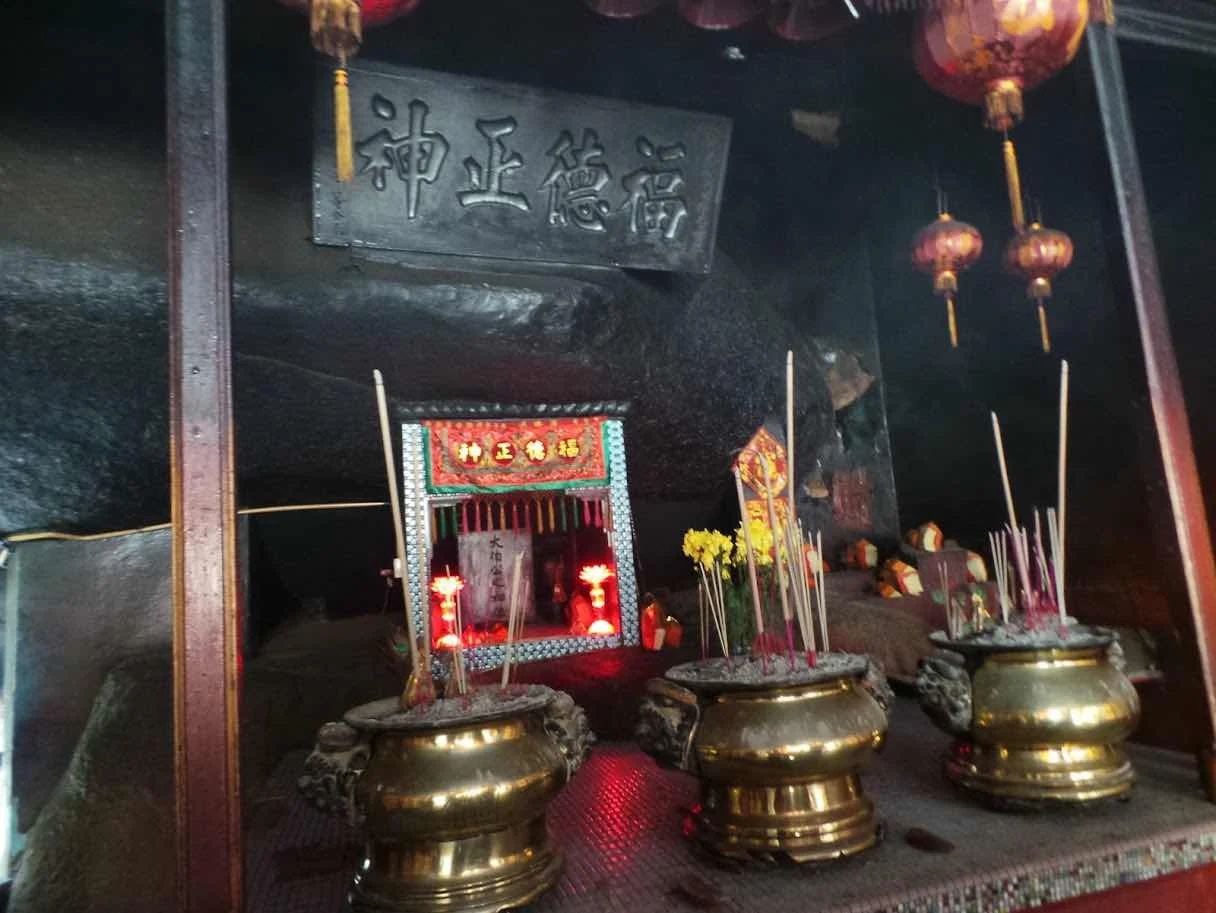Hai Choo Soo Tua Pek Kong

開山地主張公之莹

大埔

永定





檳榔㠘海珠大伯公
張公 (given as 張理 in some references)
丘兆進
馬福春
開山地主張公之莹
大埔
清兆進邱公之塋
永定
福春馬君
嘉慶十四年(1809)
檳榔㠘海珠大伯公廟重修碑記
海珠與大伯公·吾客族先賢張丘馬三公也,張公居長,丘公居次,馬公年最少, 三公於前清乾隆十八世紀中葉,南來檳榔㠘,或為教讀,或業鉄匠,或管炭窯,而興合金蘭,義園兄弟, ■聚則論道勵出,出则講信修睦,厚德高風,群倫共仰,一タ,張公忽坐化石巖中,即廟址也。丘馬二公固塟張公于巖石之側,碑書上『開山地主張公,丘公殁·馬公塟丘公于張公坟之旁·碑書『大埔清進丘公墓』,
嗣後英人萊特少校經営是邦,移居之民渐衆,感受張丘二公流風遗澤之化者亦日廣·嘉慶四年己未·公元一七九九年,胡靖公以張公羽化之起為廟,嘉慶六年辛酉冬·鄉先輩陳澤生等·公廟香火鼎盛:而交通朱暢,顶禮不易,因就市區向政府領得地叚九千九百九十六方尺·建算分祠,以便市民瞻拜,此即大伯公街福德祠也·嘉慶十四年馬公殁,吾旅人古復叠馬公於張丘二公坟下,碑書永定福春馬府君之墓,居民感念三公之德之義,俱以神祀之·並尊為大伯公
公元一九五八年一月十九日農曆丁酉年十一月三十日吉旦
Inscription on the Renovation of the Hai Choo Soo Tua Pek Kong Temple
Hai Choo Tua Pek Kong - Zhang, Qiu, and Ma - were our Hakka ancestors. Zhang was the eldest, Qiu the second, and Ma the youngest. In the mid-18th century during the Qing Dynasty's Qianlong era, they came south to Penang Island. One worked as tutor, one as blacksmith, and one managed charcoal kilns. They formed a close bond like sworn brothers. When gathered, they discussed principles and encouraged excellence; when out, they practiced trustworthiness and promoted harmony. Their virtue and integrity were universally admired. One day, Zhang passed away while sitting in meditation in a stone cave, which is now the temple site. Qiu and Ma buried Zhang beside the cave, with a tombstone inscribed: "Zhang, the pioneer founder. After Qiu's death, Ma buried Qiu next to Zhang's grave, with a tombstone inscribed: "Tomb of Qiu Qingjin of Dabu."
Later, when the Captain Francis Light developed the territory and the immigrant population gradually grew, more people were inspired by the legacy and influence of Zhang and Qiu. In 1799 (Jiaqing 4), Mr. Hu Jing built a temple where Zhang had ascended. In the winter of 1801 (Jiaqing 6), elders like Chen Zesheng found the temple increasingly popular, but inconvenient to access for worship. So they applied for a plot of 9,996 square feet from the government in the town area and built a branch shrine for the convenience of worshippers. This is the Fude Temple on Dabogong Street. When Ma passed away in 1809 (Jiaqing 14), our Hakka community reburied Ma below the graves of Zhang and Qiu, with a tombstone inscribed: "Tomb of Ma Fuchun of Yongding." Local residents, grateful for the virtues and righteousness of the three elders, worshipped them as deities and revered them as Tua Pek Kongs
Comments
Post a Comment